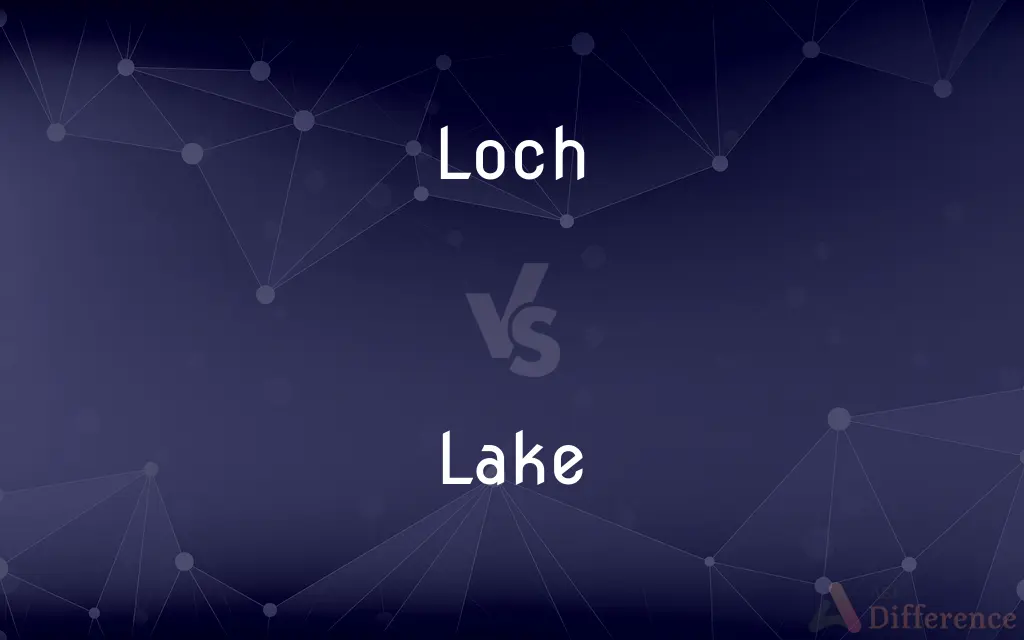Loch vs. Lake — What's the Difference?
By Maham Liaqat & Urooj Arif — Updated on March 12, 2024
A loch is a Scottish term for a lake or a sea inlet, often associated with deep, freshwater bodies in Scotland, while a lake is a large body of water surrounded by land, found worldwide.

Difference Between Loch and Lake
Table of Contents
ADVERTISEMENT
Key Differences
Loch is a term predominantly used in Scotland to refer to freshwater lakes or sea inlets. It encompasses both natural freshwater bodies and sea inlets, suggesting a broader definition in its native context. On the other hand, lake is a universally recognized term for a sizable body of water that is surrounded by land, primarily consisting of freshwater and found in various geographical locations around the world.
While the term loch is geographically and culturally specific to Scotland, reflecting the country's unique landscapes and historical context, the concept of a lake is universal, with lakes being recognized and named as such across different cultures and languages. This universality makes "lake" a more globally understood term, whereas "loch" carries specific regional connotations and heritage.
Lochs are often associated with deep waters and dramatic scenery, part of Scotland's rugged terrain, including famous examples like Loch Ness, known for its folklore and natural beauty. Lakes, however, can vary greatly in size, depth, and ecological characteristics, ranging from the Great Lakes of North America to small, shallow bodies of water in other parts of the world.
The naming conventions for lochs often include the Gaelic language, reflecting Scotland's cultural heritage, with names that can denote characteristics of the waterbody or its surroundings. In contrast, lake names can derive from a variety of languages and sources, often reflecting the geographical, historical, or cultural significance of the area in which they are located.
Legally and environmentally, the management and protection of lochs can be subject to Scottish laws and conservation efforts, tailored to the specific needs and challenges of Scotland's natural landscape. Lakes around the world are managed by a wide range of policies and regulatory frameworks, reflecting the diverse legal, environmental, and socio-economic contexts in which they exist.
ADVERTISEMENT
Comparison Chart
Definition
Scottish term for a lake or sea inlet
Large body of water surrounded by land
Geographic Scope
Specific to Scotland
Found worldwide
Types
Includes freshwater lakes and sea inlets
Primarily freshwater, though saline lakes exist
Cultural Significance
Strongly tied to Scottish heritage and folklore
Universal significance with diverse cultural associations
Management
Subject to Scottish laws and conservation efforts
Managed under various international and local regulations
Compare with Definitions
Loch
Found specifically in Scottish landscapes.
The Scottish Highlands are dotted with numerous lochs, each with its own unique charm.
Lake
Names can have diverse origins.
Lake Titicaca, South America's largest freshwater lake, is named using the local indigenous language.
Loch
Scottish term for freshwater lake or sea inlet.
Loch Lomond is renowned for its beauty and size, attracting visitors from around the globe.
Lake
Subject to a range of management practices.
Lake Victoria, shared by several African countries, requires cooperative international conservation efforts.
Loch
Can denote deep water bodies within Scotland.
Loch Ness is famous worldwide for its mythical monster, Nessie.
Lake
Universally found in various geographical settings.
Crater Lake in Oregon, USA, is a deep lake formed within a caldera.
Loch
Names often rooted in Gaelic, reflecting cultural heritage.
Loch Duich features a picturesque castle on its shores, embodying Scotland's historical allure.
Lake
Varies widely in size, depth, and ecological characteristics.
The shallow Lake Eyre in Australia occasionally fills with water, transforming into a large salt lake.
Loch
Managed according to Scottish environmental policies.
Conservation efforts in Loch Maree focus on preserving its natural ecosystem and wildlife.
Lake
Large body of water surrounded by land.
Lake Superior, one of the Great Lakes, is the largest freshwater lake by surface area in the world.
Loch
Loch () is the Irish, Scottish Gaelic and Scots word for a lake or for a sea inlet. It is cognate with the Manx lough, Cornish logh, and one of the Welsh words for lake, llwch.
Lake
A lake is an area filled with water, localized in a basin, surrounded by land, apart from any river or other outlet that serves to feed or drain the lake. Lakes lie on land and are not part of the ocean, although like the much larger oceans, they form part of Earth's water cycle.
Loch
A lake.
Lake
A large area of water surrounded by land
Lake Victoria
Boys were swimming in the lake
Loch
An arm of the sea similar to a fjord.
Lake
An insoluble pigment made by combining a soluble organic dye and an insoluble mordant.
Loch
A lake.
Lake
A large inland body of fresh water or salt water.
Loch
A bay or arm of the sea.
Lake
A scenic pond, as in a park.
Loch
Alternative form of lohoch
Lake
A large pool of liquid
A lake of spilled coffee on my desk.
Loch
A lake; a bay or arm of the sea.
Lake
A pigment consisting of organic coloring matter with an inorganic, usually metallic base or carrier, used in dyes, inks, and paints.
Loch
A kind of medicine to be taken by licking with the tongue; a lambative; a lincture.
Lake
A deep red.
Loch
A long narrow inlet of the sea in Scotland (especially when it is nearly landlocked)
Lake
A large, landlocked stretch of water or similar liquid.
Loch
Scottish word for a lake
Lake
A large amount of liquid; as, a wine lake.
Lake
A small stream of running water; a channel for water; a drain.
Lake
(obsolete) A pit, or ditch.
Lake
(obsolete) An offering, sacrifice, gift.
Lake
(dialectal) Play; sport; game; fun; glee.
Lake
(obsolete) A kind of fine, white linen.
Lake
In dyeing and painting, an often fugitive crimson or vermillion pigment derived from an organic colorant (cochineal or madder, for example) and an inorganic, generally metallic mordant.
Lake
In the composition of colors for use in products intended for human consumption, made by extending on a substratum of alumina, a salt prepared from one of the certified water-soluble straight colors.
The name of a lake prepared by extending the aluminum salt prepared from FD&C Blue No. 1 upon the substratum would be FD&C Blue No. 1--Aluminum Lake.
Lake
(obsolete) To present an offering.
Lake
To leap, jump, exert oneself, play.
Lake
To make lake-red.
Lake
A pigment formed by combining some coloring matter, usually by precipitation, with a metallic oxide or earth, esp. with aluminium hydrate; as, madder lake; Florentine lake; yellow lake, etc.
Lake
A kind of fine white linen, formerly in use.
Lake
A large body of water contained in a depression of the earth's surface, and supplied from the drainage of a more or less extended area.
Lake
To play; to sport.
Lake
A body of (usually fresh) water surrounded by land
Lake
A purplish red pigment prepared from lac or cochineal
Lake
Any of numerous bright translucent organic pigments
Common Curiosities
Why is the term "loch" used primarily in Scotland?
The term "loch" is part of the Scottish Gaelic language, reflecting Scotland's cultural and historical context.
How do the ecological characteristics of lochs and lakes compare?
Both lochs and lakes can support diverse ecosystems, but their specific ecological characteristics depend on factors like location, depth, and water chemistry.
How are names of lochs and lakes determined?
Names can be derived from geographical features, cultural or historical significance, or indigenous languages, reflecting the diversity of landscapes and cultures.
What are some of the largest lakes in the world?
The Caspian Sea, Lake Superior, and Lake Victoria are among the largest lakes by area and volume.
Is there a difference in how lochs and lakes are managed?
Management practices can differ based on the legal and environmental policies of the country or region, with lochs being managed under Scottish regulations.
Can a loch be a sea inlet as well as a freshwater lake?
Yes, in Scotland, the term "loch" can refer to both freshwater lakes and sea inlets.
Do all countries have terms equivalent to "loch"?
Many languages have specific terms for lakes, but "loch" is uniquely associated with Scotland due to its Gaelic origins.
Are all lochs deep and large?
While many lochs, especially those in the Highlands, are deep and large, there are also smaller lochs varying in size and depth.
What role do lochs play in Scottish folklore?
Lochs are prominent in Scottish folklore, with Loch Ness and its legendary monster being the most famous example.
How do conservation efforts for lochs and lakes differ?
Conservation efforts are tailored to the specific environmental challenges and legal frameworks of the region, with lochs benefiting from Scotland-specific conservation strategies.
Share Your Discovery

Previous Comparison
Novation vs. Assignment
Next Comparison
Looking vs. StaringAuthor Spotlight
Written by
Maham LiaqatCo-written by
Urooj ArifUrooj is a skilled content writer at Ask Difference, known for her exceptional ability to simplify complex topics into engaging and informative content. With a passion for research and a flair for clear, concise writing, she consistently delivers articles that resonate with our diverse audience.














































